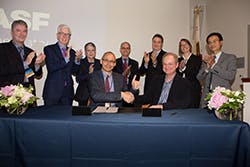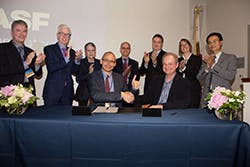California Research Alliance By BASF Marks Third Anniversary
Dr. Peter Eckes, president of bioscience research and North America research representative, BASF and Prof. Paul Alivisatos, vice chancellor of research, UC Berkeley sign agreement to extend CARA for five years. Left to right: Prof. Doug Clark, dean, College of Chemistry, UC Berkeley; Gray Davis, former governor of California; Janet Napolitano, president, University of California; Prof. Omar Yaghi, founding director of CARA, UC Berkeley; Dr. Harald Lauke, president of Advanced Materials and Systems Research, BASF; Kerstin Schierle-Arndt, associate director of CARA, BASF; Prof. Peidong Wang, founding director of CARA, UC Berkeley.
Many scientific discoveries and patent applications have reportedly resulted from more than 25 research projects underway since West Coast universities and BASF established the California Research Alliance (CARA) by BASF in 2014. This multidisciplinary collaboration headed by the College of Chemistry at the University of California, Berkeley (UC Berkeley) conducts research on new inorganic and other advanced materials, biosciences and their applications.To mark three years of CARA researchers working alongside BASF counterparts, members of these universities, guest professors, students and BASF convened for an Anniversary Symposium, April 24-25, 2017, at UC Berkeley to address recent research advancements. During the event, leaders from UC Berkeley and BASF announced a five-year extension of the CARA collaboration at a signing ceremony.
Over the last three years, BASF experts and researchers from UC Berkeley, Stanford, UC Davis, UC Santa Barbara, UC San Francisco and UC Los Angeles, have worked together on multiple research projects to make new materials, advance the functionality and performance of materials and develop methods and tools for tailoring the interaction between chemicals and biological systems. One recent advancement was achieved by a joint team active in the field of catalysis. The researchers developed a synthesis of binary intermetallic nanoparticles from a combination of noble and base metals, which have the potential to be used in catalysis applications.
“Previously, there were only physical methods for manufacturing very small quantities of such intermetallic nanoparticles. With this newly discovered chemical approach, a critical first step was taken towards preparation of these materials in large scales, which is a prerequisite for assessing their potential for industrial catalysis,” says Peter Walther, senior vice president, Heterogeneous Catalysis, BASF. “The extensive nanoparticles expertise and application know-how at CARA combined with guidance provided to the postdoctoral researchers by Professor Paul Alivisatos and BASF were certainly decisive for the development of this new method.”
Following the successful tests at UC Berkeley, the synthesis of the nanoparticles and their potential application in catalysis is being further evaluated in BASF laboratories in Ludwigshafen, Germany, according to the company.
For more information, visit: www.basf.com

